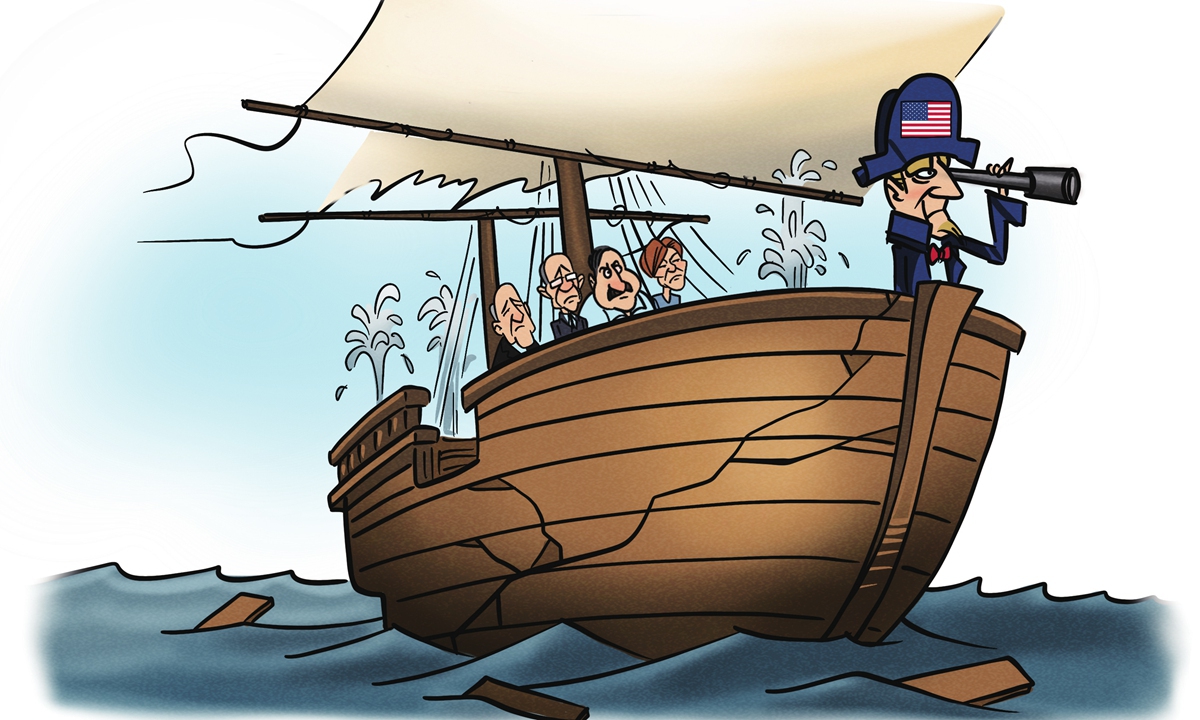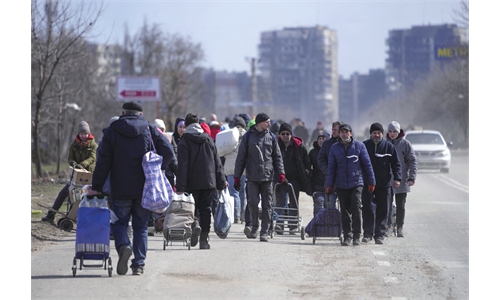
Illustration: Liu Rui/GT
US President Joe Biden wrapped up his visit to Europe on Saturday. During his four-day trip, Biden engaged in intensive diplomatic events focusing on the Ukraine crisis. He attended summits of NATO, G7 and EU. However, after so many summits with the aim to strengthen the role of so-called trans-Atlantic alliance, no actual measure was put forward to promote peace and talks - not even a public statement.
In contrast, Biden motivated the enhancement of sanctions on Russia, striving to prevent his European allies from falling back on this issue. Besides, the joint statement, which demonstrates Washington's stance, even took an aim at China, demanding that China cooperate with the West's sanctions. US National Security Advisor Jake Sullivan previously set redlines. He told reporters that China and every significant economy should not take advantage of business opportunities created by sanctions, help Moscow evade export controls or process its banned financial transactions.
As the initiator of the Ukraine crisis, the US is trying to push the entire world into its huge trap. The US has lured and threatened developing countries including China, attempting to make the international community share the responsibilities and consequences of the crisis. Nevertheless, it must be pointed out that no other country is obligated to pay the price for the crisis created by the US and that Washington is not qualified to set redlines for other countries.
During Biden's trip to Europe, the US and the EU signed a historic agreement on?liquefied?natural gas, in a bid to reduce?Europe's?reliance on Russian energy. But many Western media expressed pessimism about the deal because the US doesn't have enough capacity to export more gas, so the deal will be largely symbolic. This is the strategic risk Washington is happy to take: It has only the ambition to create chaos but has no intent to clean up the mess. From Afghanistan to Iraq and Syria, the US has left the world in too many messes.
After the outbreak of the Russia-Ukraine conflict, the US has continued to escalate sanctions against Russia and coerce the world to choose sides, adding to the hardship of global economic recovery and causing undue damage to the livelihoods of all countries. People see that the US is turning into a deformed giant, with an arm of sanctions or even war used to suppress others becoming exceptionally developed, and the arm of peace and development becoming greatly atrophied and degenerated. This has led Washington to claim to oppose war while waging war on all fronts, and to claim to maintain peace while wantonly destroying it.
In the 1990s, former US diplomat George Kennan, known as the "father of containment," warned that "expanding NATO would be the most fatal error of American policy in the entire post-cold-war era." If NATO's expansion is the decision of politicians with a penchant for zero-sum games, then Washington has to face the reality that the spirit is willing but the flesh is weak. Although the US has a muscular arm to suppress others, it is still facing an increasingly stretched dilemma, and it cannot weave a network of sanctions against Russia alone. It needs the firm support of its allies, as well as the broad cooperation of non-Western countries.
That's why warning China not to support Russia has become a deliberately prominent issue in Washington, while pulling in its allies to reinforce sanctions against Russia. Thus, it continues to suppress China, which it considers its strategic rival, while expecting China to cooperate with it in sanctioning Russia. Of course, there is a deeper reason for this: The US would rather have a two-front war against China and Russia, lest China be given a strategic respite. There are waves of smears against China from the US to prevent it from staying out of this trouble.
The US has long sought enemies around the globe, and even if there is none, it creates one. We might remind Washington that the established?powers are often not defeated by emerging powers, but dragged down by the cost of maintaining hegemony. Recently, the US wanted to kick Russia out of the G20, but several countries have clearly expressed their opposition. Today's world is no longer in the era when a few countries like the US can hoodwink the public; most countries will not join the "self-mutilating game" by helping the US maintain its hegemony.

